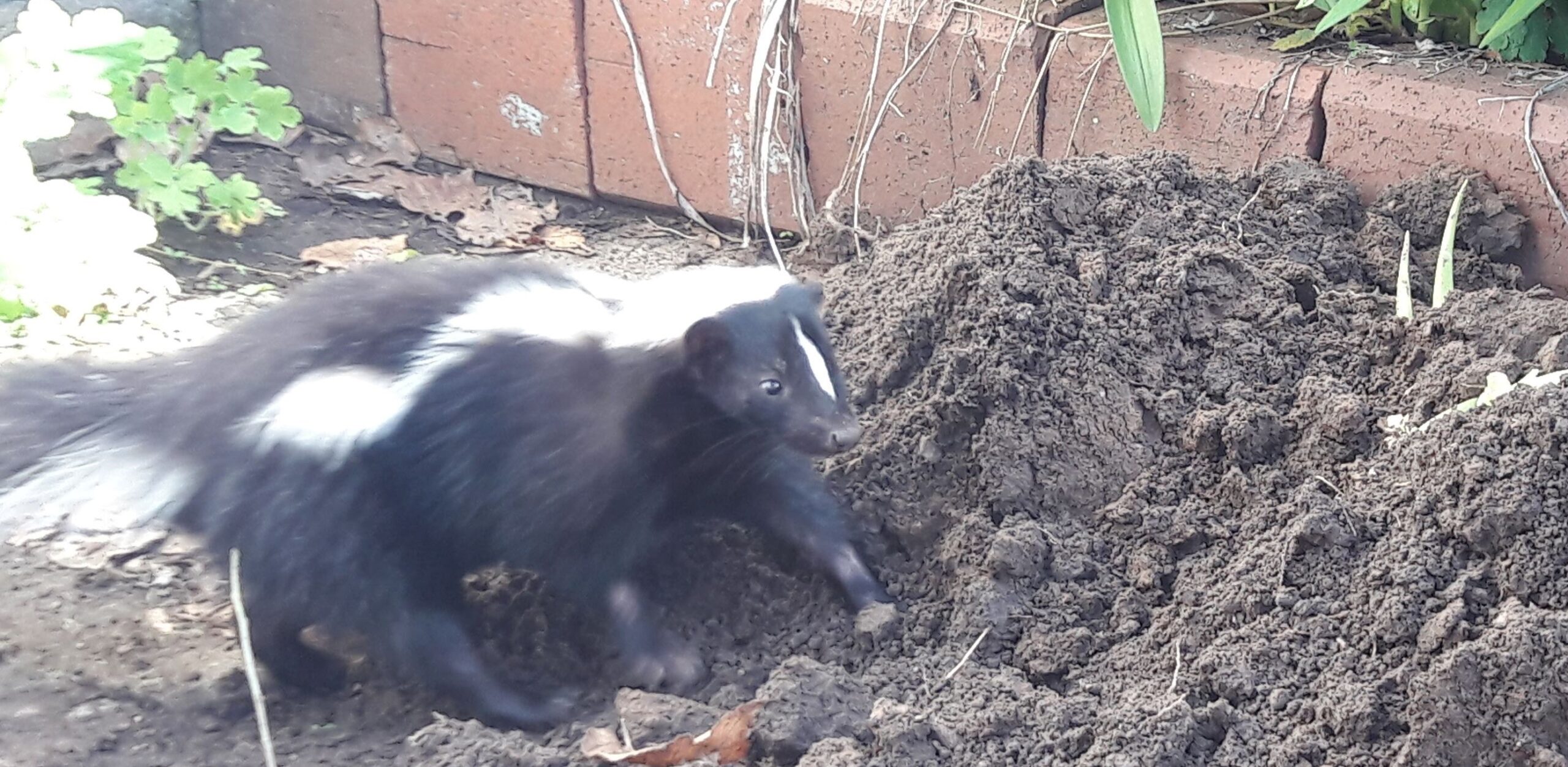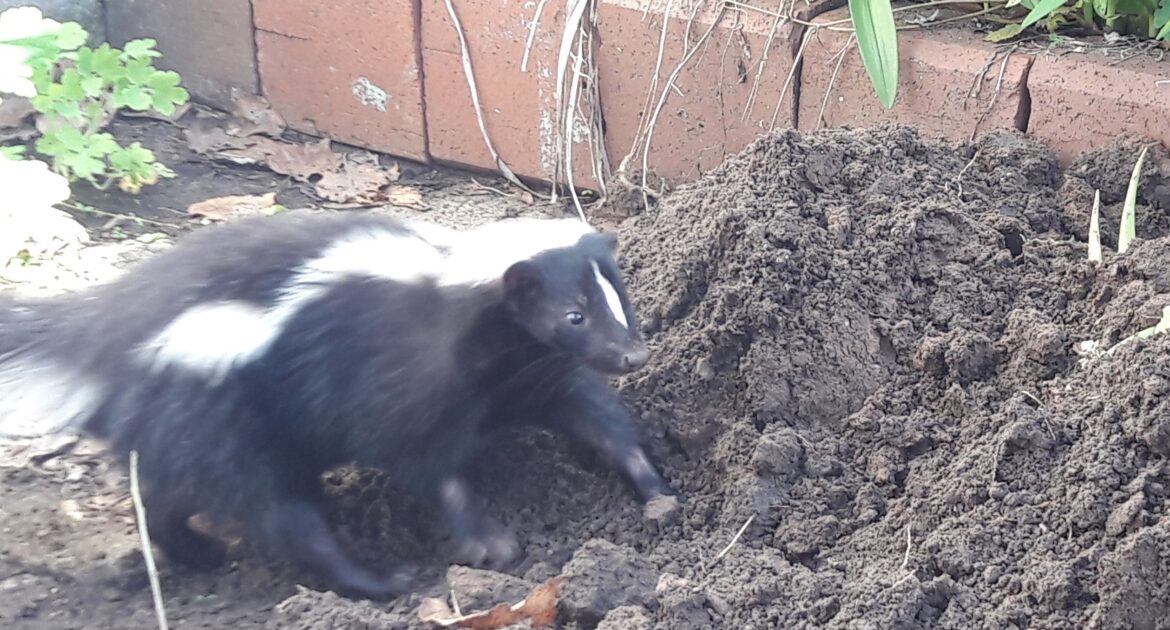You might think skunks are safe from danger because of their smelly spray. But the truth is, these black and white animals do face threats in the wild. Yes, they have natural predators, even though their famous scent keeps most enemies away. Some brave animals will still hunt skunks when they need food.
Skunk’s natural predators include large birds, some mammals, and even a few reptiles. What eats skunks depends on where they live and what other animals share their space. Skunk survival in the wild is harder than many people think.
If you live in Woodbridge and have noticed skunks around your property, you’re not alone. These animals often look for safe places to live and raise their babies.
Let’s explore which animals dare to challenge a skunk’s defence system and how these encounters shape their behaviour in nature.
The Great Horned Owl
The great horned owl is a big threat. These powerful birds hunt at night when skunks are most active. What makes owls so successful at catching skunks? They attack from above with no warning.
Great horned owls have some special advantages:
- They hunt silently with soft feathers that make no sound
- Their sharp talons can grab quickly
- They have poor sense of smell, so spray doesn’t bother them
- They’re strong enough to carry small animals away
These owls don’t give skunks time to spray. They swoop down fast and grab their target before the skunk knows what’s happening. This makes them one of the few animals that regularly eat skunks.
Red-Tailed Hawks and Other Birds of Prey
Red-tailed hawks also hunt skunks, especially younger ones. These large birds circle high in the sky looking for prey. When they spot a skunk in an open area, they dive down at high speed.
Hawks work best when skunks are caught away from cover. Young skunks are easier targets because they’re smaller and less experienced. While adults can sometimes escape if they make it to thick brush or underground burrows.
Other birds that might eat skunks include:
- Eagles (where they share the same habitat)
- Large falcons
- Vultures (usually eat skunks that are already dead)
Coyotes: Smart and Patient Hunters
Coyotes are clever animals that have learned how to hunt skunks safely. They don’t just rush in and hope for the best. Instead, they use smart tactics to avoid getting sprayed.
A coyote might circle around a skunk, trying to attack from behind or the side. They move fast and try to grab the skunk’s head or neck area. This stops them from being able to aim its spray properly.
Coyotes also hunt in packs sometimes. When several coyotes work together, it’s much harder for a skunk to defend itself. One coyote might distract the skunk while another attacks from a different direction.
Mountain Lions and Bobcats
Large cats like mountain lions and bobcats will eat skunks when other food is hard to find. These powerful predators can overpower them quickly with their strength and speed.
Mountain lions are big enough that they don’t worry much about skunk spray. They can kill them so fast that it doesn’t have time to spray. Bobcats are smaller but still dangerous to skunks. They use their quick reflexes to avoid the spray while attacking.
Both types of cats prefer to hunt other animals when possible. Skunks are usually not their first choice for dinner. But when rabbits, deer, or other prey animals are scarce, cats will hunt skunks.
Domestic Dogs
Some large domestic dogs will chase and catch skunks. This usually happens by accident when dogs are exploring yards or walking with their owners. Most dogs learn quickly to avoid them after getting sprayed once.
However, some hunting dogs or farm dogs might continue to chase skunks even after bad experiences. These dogs often have strong prey drives that make them ignore the smell.
Dog and skunk encounters are common in areas like Woodbridge where both animals live close to people. Most of these meetings end with a very smelly dog and an escaped skunk.
Snakes and Other Unexpected Predators
Large snakes sometimes eat young skunks or eggs. Bull snakes and rat snakes are big enough to swallow small skunks whole. These snakes usually find baby skunks in their dens when the mother is away looking for food.
Other animals that might eat skunks include:
- Badgers (they can dig skunks out of burrows)
- Foxes (usually only attack young skunks)
- Large raccoons (rare, but it happens)
- Bears (they might eat skunks they find, but don’t usually hunt them)
How Skunks Defend Themselves
They have several ways to stay safe from predators. Their famous spray is just one defence method. Understanding how these animals protect themselves helps explain why they sometimes seek shelter near human homes.
Skunks can spray their scent up to 10 feet away with good accuracy. The smell is so strong that most animals run away immediately. But they can only spray a few times before they need to make more scent. This takes several days.
Other defence methods include:
- Hiding in burrows during the day
- Moving slowly and carefully to avoid detection
- Stamping their feet and raising their tails as warnings
- Playing dead when extremely scared
- Living near human homes where large predators are rare
Why Skunks Come to Human Areas
Skunk survival in the wild becomes easier when they live near people. Human neighbourhoods have fewer large predators like owls, hawks, and coyotes. This makes residential areas attractive to skunks looking for safe places to live.
They also find plenty of food around human homes. They eat insects, small rodents, bird eggs, and sometimes pet food left outside. Garbage cans and compost piles provide additional food sources.
The problem comes when these animals decide to make their homes under porches, decks, or sheds. While they’re usually harmless to people, nobody wants them living in their yard.
What Happens When Skunks Move Into Your Property
If they choose your property as their new home, you’ll probably notice signs like:
- Strong odour around your yard
- Small holes dug in your lawn
- Disturbed garbage cans
- Pet food disappearing
- Scratching sounds under structures
They often move under buildings to have their babies. These areas protect them from their natural predators and provide shelter from weather. A mother with babies will defend her den aggressively.
Professional Wildlife Control Solutions
When skunks take up residence on your property, professional help is the safest option. At Skedaddle Humane Wildlife Control in Woodbridge, we understand typical wildlife behaviour and use effective methods to solve these problems.
We use one-way doors that allow them to leave their hiding spots but prevent them from coming back. This humane approach lets the animals find new homes without causing harm to them or your family.
Our trained technicians also seal up entry points and remove attractants that bring these animals to your property. This comprehensive approach solves the current problem and prevents future issues.
Trying to remove them yourself often ends badly. They will spray when they feel threatened, and the smell can linger for weeks. Professional wildlife control experts know how to work safely around these animals.
Ready to Solve Your Skunk Problem?
Skunk natural predators, like owls and coyotes help control wildlife populations in wild areas. But when skunks move into residential neighbourhoods, natural predation becomes less effective.
Understanding what they eat and how skunk survival in the wild works helps explain why these animals often end up in human spaces.
If you’re dealing with skunks on your Woodbridge property, don’t try to handle the situation alone. Contact Skedaddle Humane Wildlife Control for professional help. Our experienced team knows how to safely remove skunks and prevent them from returning.
Request an estimate today and get back to enjoying your yard without unwanted wildlife visitors.




